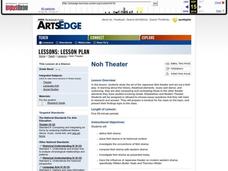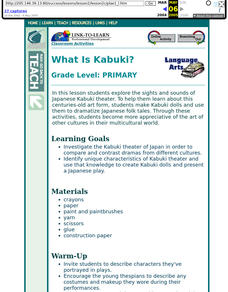National Endowment for the Humanities
Hamlet Meets Chushingura: Traditions of the Revenge Tragedy
Young scholars read texts, view film and video and conduct research in an analysis and comparison of Shakespeare's "Hamlet" and the Kabuki piece "Chushingura". They focus their analysis on the theme of revenge.
Curated OER
Noh Theater
Students take a closer look at Japanese drama. In this Japanese culture lesson plan, students study the attributes of Noh theater and compare it western theater. Students conduct independent research on the art form prior to acting out a...
Curated OER
Shintoism
Take a trip to Japan in this bright and vivid presentation that displays the philosophies and traditions of Shintoism. Pictures of temples, shrines, and theater productions will enthrall your class and bring their study of world...
Curated OER
Noh Theater
Students compare Noh drama to western drama and trace the influence of Japanese theater on modern western drama. In this Noh drama lesson, students read the play Black Tomb (Kurozuko) defining the elements and conventions of Noh drama...
Curated OER
Noh Theater
Pupils explore the roles in Noh drama and the significance of Noh masks while creating their own version of a Noh play in this High School instructional activity adaptable for either the Language Arts or Theater classroom.
Curated OER
Ukiyo-e
Students investigate and examine ukiyo-e, or Japanese woodblock prints, from the Edo period (1615-1868) in Japan and use this gained knowledge to compare Japanese culture to American societal trends.
Curated OER
Classroom Conservation
Fourth graders suggest ways paper and other natural resources can be used and recycled in the classroom. Students conduct a investigation into paper use and make distinctions among observations, conclusions (inferences), and predictions.








